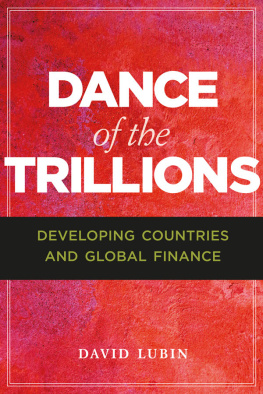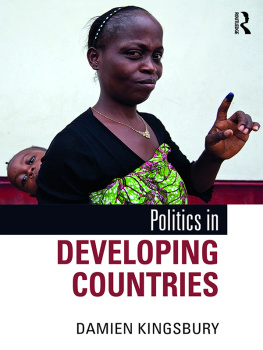David Lubin - Dance of the Trillions: Developing Countries and Global Finance
Here you can read online David Lubin - Dance of the Trillions: Developing Countries and Global Finance full text of the book (entire story) in english for free. Download pdf and epub, get meaning, cover and reviews about this ebook. year: 2018, publisher: Brookings Institution Press, genre: Politics. Description of the work, (preface) as well as reviews are available. Best literature library LitArk.com created for fans of good reading and offers a wide selection of genres:
Romance novel
Science fiction
Adventure
Detective
Science
History
Home and family
Prose
Art
Politics
Computer
Non-fiction
Religion
Business
Children
Humor
Choose a favorite category and find really read worthwhile books. Enjoy immersion in the world of imagination, feel the emotions of the characters or learn something new for yourself, make an fascinating discovery.
- Book:Dance of the Trillions: Developing Countries and Global Finance
- Author:
- Publisher:Brookings Institution Press
- Genre:
- Year:2018
- Rating:5 / 5
- Favourites:Add to favourites
- Your mark:
- 100
- 1
- 2
- 3
- 4
- 5
Dance of the Trillions: Developing Countries and Global Finance: summary, description and annotation
We offer to read an annotation, description, summary or preface (depends on what the author of the book "Dance of the Trillions: Developing Countries and Global Finance" wrote himself). If you haven't found the necessary information about the book — write in the comments, we will try to find it.
David Lubin: author's other books
Who wrote Dance of the Trillions: Developing Countries and Global Finance? Find out the surname, the name of the author of the book and a list of all author's works by series.
Dance of the Trillions: Developing Countries and Global Finance — read online for free the complete book (whole text) full work
Below is the text of the book, divided by pages. System saving the place of the last page read, allows you to conveniently read the book "Dance of the Trillions: Developing Countries and Global Finance" online for free, without having to search again every time where you left off. Put a bookmark, and you can go to the page where you finished reading at any time.
Font size:
Interval:
Bookmark:



Providing new perspectives and knowledge on an increasingly complex, uncertain, and interconnected world.
The Chatham House Insights Series
Series Editor: Caroline Soper
The Insights series provides new perspectives on and knowledge about an increasingly complex, uncertain, and interconnected world. Concise, lively, and authoritative, these books explore, through different modes of interpretation, a wide range of country, regional, and international developments, all within a global context. Focusing on topical issues in key policy areas, such as health, security, economics, law, and the environment, volumes in the series will be written accessibly by leading expertsboth academic and practitionerto anticipate trends and illuminate new ideas and thinking. Insights books will be of great interest to all those seeking to develop a deeper understanding of the policy challenges and choices facing decision makers, including academics, practitioners, and general readers.
Published or forthcoming titles:
Amitai Etzioni, Foreign Policy: Thinking Outside the Box (2016)
Keir Giles, Moscow Rules: How Russia Works, and What It Means for the West (forthcoming)
Nigel Gould-Davies, Global Risk in an Age of Transformation (forthcoming)
Chatham House, the Royal Institute of International Affairs, is a world-leading policy institute based in London. Its mission is to help governments and societies build a sustainably secure, prosperous, and just world.
Chatham House does not express opinions of its own. The opinions expressed in this publication are the responsibility of the author(s).
of the
Developing Countries and Global Finance
DAVID LUBIN
BROOKINGS INSTITUTION PRESS
Washington, D.C.
CHATHAM HOUSE
The Royal Institute of International Affairs
London
Copyright 2018
THE BROOKINGS INSTITUTION
1775 Massachusetts Avenue, N.W., Washington, D.C. 20036
www.brookings.edu
All rights reserved. No part of this publication may be reproduced or transmitted in any form or by any means without permission in writing from the Brookings Institution Press.
The Brookings Institution is a private nonprofit organization devoted to research, education, and publication on important issues of domestic and foreign policy. Its principal purpose is to bring the highest quality independent research and analysis to bear on current and emerging policy problems. Interpretations or conclusions in Brookings publications should be understood to be solely those of the authors.
Library of Congress Cataloging-in-Publication data are available.
ISBN 978-0-8157-3674-5 (pbk : alk. paper)
ISBN 978-0-8157-3664-6 (ebook)
9 8 7 6 5 4 3 2 1
Typeset in Adobe Garamond
Composition by Elliott Beard
In memory of Donald and Gloria
I am very grateful to Robin Niblett, who kindly allowed me to attach myself to Chatham House as a Visiting Fellow during the months that I worked on this book, and to Andrew Pitt, who with equal kindness allowed me to detach myself from my day job at Citi during the same period.
Michel Nies was exceptionally helpful in providing me with data and analysis to support what I have written here. Sebastian Mallabys comments on my draft improved it considerably, as did Jake Stathams careful editing. I would also like to thank Samiran Chakraborty, Johanna Chua, Pete Dattels, Fernando Diaz, Gene Frieda, Nigel Gould-Davies, Donato Guarino, Anurag Jha, Peter Jones, Piotr Kalisz, James Kynge, Catherine Mann, Felix Martin, Siddharth Mathur, Amanda Moss, Ernesto Revilla, Caroline Soper, Ivan Tchakarov, Ekaterina Vlasova, Adam Ward, and Jonathan Wheatley for their comments, discussions, and help at various stages of this project. I am also very grateful to Willem Buiter and Hlne Rey for their encouragement.
And to Tamara, Daniel, and Hannah, I owe much more than thanks. To them I owe everything.
HAVANA, 1920
In the summer of 1920, Havana must have felt like the throbbing heart of civilization. Its main thoroughfare, the Prado, was as packed with cars as Fifth Avenue in New York, as Rolls-Royces and Pierce Arrows flowed along the tree-lined boulevard. The world-famous tenor Enrico Caruso, in the twilight of his career, was paid $10,000 for each performance during a Cuban tour. Farmers came to town to spend money in the citys jewelry shops. All in all, the ashes of the Great War seemed to dust off easily that summer in the Caribbean, revealing a shiny confidence about the future.
This heady economic boom came to be named, after a 1916 musical production that had toured Havana, the Dance of the Millions. At the root of the boom was an explosion in sugar prices that catapulted Cuba toward wealth that could otherwise only have been dreamed of. Wartime controls on the price of sugar had been gradually lifted toward the end of 1918, and Cuba was the country most surely in a position to take advantage of this, as its sugar production had increased substantially during the war years: by 1918 the countrys sugar output was some 3.4 million metric tonnes, a million tonnes higher than its prewar level.
Outside Cuba, war-related changes in the global sugar market were also working in Cubas favor. The war had destroyed the sugar beet fields of Germany and Austria-Hungary, and Europes sugar output had shriveled. This allowed the Cuban Sugar Cane Corporation to emerge as the biggest sugar company in the world. The wars end had also helped trigger a surge in the demand for sugar, not least because of the January 1919 ratification of the Eighteenth Amendment in the United States: the prohibition of alcohol pushed U.S. consumers toward sugar-based soft drinks in a way never before seen, and per capita consumption of soft drinks in the United States rose from nineteen bottles in 1914 to thirty-eight bottles in 1919.
The rise in sugar prices during 1919 took on a bizarre quality. In a country where a sugar price of 5 cents per pound was considered enough to stimulate the island to extreme prosperity, the price rose to 10 cents in March that year, to 15 cents in early April, and to 22 cents on May 19.
The boom in sugar begat a boom in finance. During the first half of 1920, the total assets of the Banco Nacional, Cubas largest bank, increased by 66 percent, and those of the Banco Espaol, Cubas oldest bank, by 33 percent. This sudden increase in the availability of credit was considerably bolstered by an inflow of funds from American banks: National City Bank opened twenty-two branches in Cuba in 1919 alone, taking advantage of the 1913 Federal Reserve Act, which had lifted restrictions on U.S. banks international expansion. Bankers must have been in a state of high excitement about the ability to secure loans on sugar crops whose value could reach untold heights. After all, if the price of sugar had doubled in just a few spring months of 1919, why couldnt it double again? And again? In a frenzy of financial activity, some fifty sugar mills, more than one quarter of the 198 existing in Cuba, were acquired by new owners in 1919 and 1920.
Font size:
Interval:
Bookmark:
Similar books «Dance of the Trillions: Developing Countries and Global Finance»
Look at similar books to Dance of the Trillions: Developing Countries and Global Finance. We have selected literature similar in name and meaning in the hope of providing readers with more options to find new, interesting, not yet read works.
Discussion, reviews of the book Dance of the Trillions: Developing Countries and Global Finance and just readers' own opinions. Leave your comments, write what you think about the work, its meaning or the main characters. Specify what exactly you liked and what you didn't like, and why you think so.








